By Claretta Bellamy
New Jersey is honoring its Black history and culture with a new trail that will mark important sites throughout the Garden State.
Gov. Phil Murphy signed Bill A2677 into law Wednesday, which gives the New Jersey Historical Commission $1 million to develop the Black Heritage Trail, a path highlighting Black historical markers and sites in the state. The commission will begin designating sites on the trail under the guidance of Secretary of State Tahesha Way and the New Jersey Black Cultural and Heritage Initiative Foundation, according to the commission’s executive director, Sara Cureton.
“The history of Black Americans in New Jersey has long been neglected, misunderstood, or even suppressed,” Cureton said in a statement to NBC News. “The establishment of the New Jersey Black Heritage Trail is one powerful way to elevate the stories of Black New Jerseyans so that we all can learn from them.”
The goal of the trail, as noted in the bill’s announcement, is for visitors and travelers to “discover the remarkable achievements and legacies of New Jersey’s African American scholars, famous figures and everyday citizens who shaped the State’s history for nearly four centuries.”
Those walking the path will have access to a downloadable itinerary and maps that pinpoint Black heritage sites, museums and modern-day attractions. A launch date for the Black Heritage Trail has not been announced, but the historical commission has already shared that it plans to add new locations as the trail grows, according to a New Jersey secretary of state spokesperson.
Lyra D. Monteiro, assistant professor in the department of history at Rutgers University-Newark, said she hopes the project will bring attention to Black people’s vital role in shaping New Jersey and its history.
“New Jersey was the last state in the North to outlaw slavery,” she said. “The fact that that history isn’t part of how we understand race and life in New Jersey in the present is a big problem.”
Monteiro said that even prestigious New Jersey universities like Rutgers and Princeton have strong ties to slavery. Last year, Rutgers University-New Brunswick acknowledged its connection to slavery by creating historical markers on its campus, including at Livingston, which is named after William Livingston, New Jersey’s first governor whose family, the university noted, acquired wealth by trafficking Black people through the translatlantic slave trade. Meanwhile, Princeton launched the “Princeton & Slavery Project” in 2017, which investigated the university’s connection to slavery.
While other states like Massachusetts have developed Black heritage trails, Monteiro said she finds community-based trails highlighting something specific in a city, like a college campus or museum, the most impactful. She hopes some of the funding for the Black Heritage Trail also goes to support the local communities.
Beyond pinpointing important events in Black history, Monteiro said she wants the trail to serve as a teaching tool for those interested in learning more about their community.
“There is Black history everywhere — in ways that are not always going to be ones that map up easily with our understanding of particular famous people who did particularly important things,” she said.



